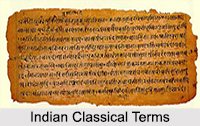 Indian Classical Terms are the illustratives of the mythology, philosophy, literature, arts, antiquities, manners and customs of the Indians whilst echoing the ethnicity of India.
Indian Classical Terms are the illustratives of the mythology, philosophy, literature, arts, antiquities, manners and customs of the Indians whilst echoing the ethnicity of India.
Origin of Indian Classical Terms
The Indian classical terms have the roots deeply seated with the Indian myths; dating back to as early as the 7200 BC, when the first hymn of the Rig Veda was composed. The hymns of Rig Veda were although the freshest example of the delight of Aryans that they exhibited whilst experiencing the bounty of nature. That was just the initiation of a new idea; the very beginning of Vedic literature. Although the subtle presence of the Indian classical terms were there in the Vedic literature, yet in a much elaborate manner these can be found in Indian folktales, fables, legends and myths. These terms amidst the stories and fables of Indian mythology have passed through generations either by word of mouth or have been secretly stored in scriptures.
Significance of Indian Classical Terms
Rich culture and deep tradition comprises the different aspects of Indian culture. The true aura of India can be thus best understood amidst the ritual, belief and mores of Indian heritage which has reshaped the Indian history, realigned the Indian mythology whilst introducing the Indian classical terms, since ages. The crest of diverse traditions and the symbol of rich ethnicity, the Indian classical terms thus so aptly demonstrates Indian religions, philosophy, rituals and myths.
This article is a stub. You can enrich by adding more information to it. Send your Write Up to content@indianetzone.com




















